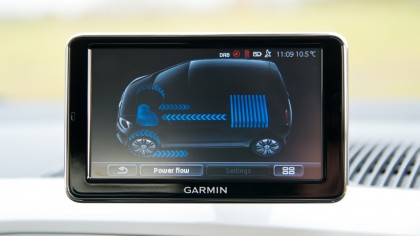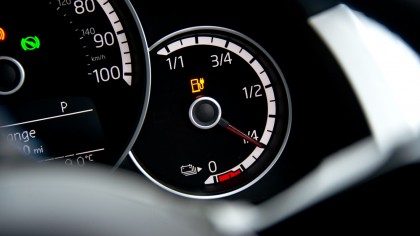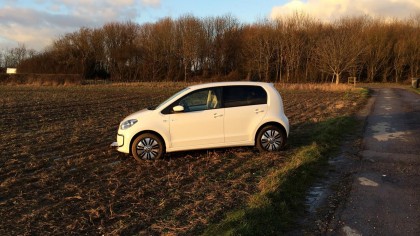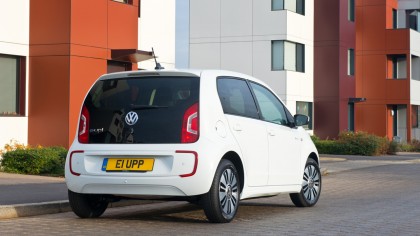Volkswagen's new e-up! electric car is shockingly good
E-up! - this EV is much better than you might think
Sign up for breaking news, reviews, opinion, top tech deals, and more.
You are now subscribed
Your newsletter sign-up was successful
For any EV, the ability to recapture kinetic energy and top up the battery on the move is critical to overall operating range. The only problem is that such regen features can result in a clumsy driving experience. It can feel like you've slammed on the brakes when you lift off of the throttle pedal.
Here, the e-up! is actually more advanced than most EVs. VW has cooked up a five-stage user-selectable system of regen, starting with pure sailing and no regeneration at all through to maximum regen which also includes automatic activation of the brake lights, such is the retardation involved.

As standard, the e-up! gets the Garmin-derived Maps & More infotainment system. It's basically a modified Garmin mini tablet that's fully integrated with the up!'s telematics systems. The difference with the e-up! is the addition of internet connectivity as standard.
That allows for the usual app-enabled remote functionality that's common to a lot of Evs. So, that includes the ability to control and schedule charging remotely, pre-heating the cabin and all that jazz.
The e-up! also has DAB radio as standard.
Drive
Crikey, it's quite quick. That's your first thought when spool up the e-up!'s electric motor. Much of that comes down to expectations. When BMW pitches an i3 as maintaining the dynamism of conventional BMWs, you expect it to be fun and nippy.
With the e-up!, you don't know quite know what it's going to be like and so it's a pleasant surprise to find it feels significantly gutsier off the line than a conventional hatchback. Admittedly, the performance tails off a bit as you approach the national speed limit. But around town, this thing really shifts.
Sign up for breaking news, reviews, opinion, top tech deals, and more.
So ignore the offical 12.4-second sprint to 62mph. It feels far quicker than that.
Of course, as an EV it does everything with zero drama and very little noise, which only adds to the impression of an effortlessly nippy car.
Again, that impression fades a little at higher speeds as wind and road noise intrude. But that's true of any EV. At motorway speeds, wind and road roar are probably more critical to refinement than engine noise.

Anyway, with the battery pack mounted flat and low in the chassis, the e-up! feels supremely stable, too. OK, it's no sports car. But it doesn't suffer from excessive body movement. Can you hustle it down a b-road? Absolutely, and you'll have plenty of fun to boot.
As for range, well, the old adage of mileage varying applies. In the official NEDC cycle it maxes out at precisely 99 miles. VW is quite open about the fact that this is more of a theoretical maximum than a real-world number.

Going by our experience of the car, we reckon you'll get at least 50 miles out of it, even driving like a berk. 60 to 80 miles is probably a realistic expectation for most normal drivers.
If that doesn't sound like much, it's worth remembering that a huge number of cars in the UK travel as little as 15 to 20 miles daily. An EV isn't a universal transport solution. But for the millions of small hatchbacks used as local runabouts, the e-up! makes a very plausible alternative.
Verdict
So what have learned about the Volkswagen e-up!? It's not the quick and dirty lash up you might have guessed, for starters. It's a properly engineered EV.
So, it's much better to drive than you might expect. The range is more than adequate for its remit. And it looks good inside and out. In fact, in many ways, it's one of the best EVs you can buy.
But is it good enough to topple the BMW i3? In simple terms, it's not as accomplished or as innovative as the i3. Yes, the i3 is around £5,000 pricer. But then it's so much more advanced, that price premium actually seems cheap.
What's more, £19,250 for the e-up! is a hell of a lot of money for what in many ways amounts to a basic hatchback. It's only slightly cheaper than VW's entry-level Passat. It also looks expensive compared to the £15,195 Renault wants for a Zoe.
However, few people buy these cars outright and when you add the £70 a month Renault charges for the Zoe's battery to the monthly lease costs, suddenly the e-up! looks competitive on price.

It's also when you consider lease deals that that i3 suddenly seems much, much more expensive. Really roughly, you're looking at about £200 a month for an e-up! vs more like £350 for an i3. That's a huge step up.
And so the new e-up! can't quite dethrone the i3. The BMW is just a bit too special for that. But VW's unassuming new EV is our pick of the circa-£20,000-and-under electric cars. It's far, far better than you'd think.
Technology and cars. Increasingly the twain shall meet. Which is handy, because Jeremy (Twitter) is addicted to both. Long-time tech journalist, former editor of iCar magazine and incumbent car guru for T3 magazine, Jeremy reckons in-car technology is about to go thermonuclear. No, not exploding cars. That would be silly. And dangerous. But rather an explosive period of unprecedented innovation. Enjoy the ride.